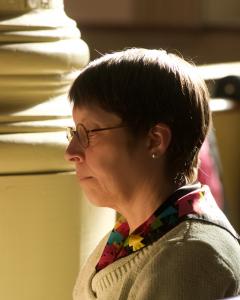A Meditation on Interdependence & the Zen Way
A talk delivered at
Blue Cliff Zen Sangha
Long Beach, California
21 November 2017
Recently I was in the produce section at a downtown grocery store. A young man with kind eyes walked up to me and said, “Do you remember that time you fell down and hit your head and the ambulance came?”
I was with him so far – yes this happened a few months earlier. A greasy meal disagreed with me, I had drunk two margaritas, I was dehydrated, and I had a fainting spell. I hit my head, and there was an ambulance and a trip to the ER.
I didn’t recognize the young man, but I was pretty out of it at the time. Maybe he was one of the paramedics. Maybe he was the one with the quiet voice who gave me a pill that instantly calmed my nausea.
But then he continued. “I’m really glad you’re well now and you found your family.” He went on to describe someone who had a pretty severe psychotic incident in front of a McDonald’s in Compton. I realized he had mistaken me for someone else. The young man was so kind and compassionate, I didn’t have the heart to tell him that he was mistaken.
And I admit I felt a flash of indignation for a moment – do I look like someone who is likely to curse and scream and thrash around on a greasy urban sidewalk?
And immediately I answered my own question: Yes I do. We all do.
Everytime we meet we chant The Five Remembrances together: “I am of the nature to have ill health. There is no way to escape having ill health.”
My trip to the ER really brought this home. I know eventually I’ll be an old lady passing out on the bathroom floor, but I was kinda counting on having maybe ten more years before that started happening. Maybe not.
There are two realities here. In one reality, I’m far removed from the experience of that woman on the Compton sidewalk. I’m guessing she’s also white, but I have the privilege of financial security and health insurance. I got an EKG and a brain scan and blood tests and solicitous staff. I wonder if she got the same care. I wonder if anyone asked her if she felt nauseated?
There’s a deeper reality that our Zen practice brings us to: I’m not separated from that woman who had a psychotic episode. We are interconnected. Her suffering is the suffering of the world. I can’t turn away from it and that makes it my suffering too.
There’s a beautiful phrase frequently spoken by John Bradford, a 16-century English theologian. When he saw prisoners being led to execution, he said: “There but for the grace of God go I.” It’s an expression of humility and gratitude.
Our Zen practice of presence takes us to a slightly different perspective: “There go I.”
This is a demanding practice. It’s a practice of not turning away. We return again and again to the present, to what is. And that presence makes us experience our interconnectedness. That remarkable young man didn’t turn away from that old white woman having a screaming fit on the sidewalk. He remembered and held her in his heart. He’s a reminder to us of the demands of our practice.
We work so hard – we return again and again to the present. To our suffering and the suffering of the world.
We’ve talked here before about the Four Noble Truths of Buddhist:
Life brings us suffering; life is suffering.
Our suffering is caused by our clinging. Mostly our clinging to the desire to have things different from the way they are.
We can escape from this cycle of suffering.
The escape is through following the noble eight-fold path of Buddhism, which includes meditation, morality, and insight.
Our cultivation and commitment and our insight leads us to realize our inseparability, our interconnedness, our oneness. And with that realization comes compassion. Our practice always leads us to compassion for suffering.
In the Dedications we chant this nearly every week:
“Buddha-nature pervades the whole universe existing right here, now. Whenever these devoted invocations are sent forth they are perceived and subtly answered. We dedicate their merits to all members of our human family, throughout space and time. We especially dedicate their merits to those who suffer as a result of calamity, cruelty, oppression, and war.”
I didn’t interrupt the young man and insist he was mistaken because I realize I don’t have the right to interrupt that flow of kindness and compassion. That woman who needed his blessing wasn’t there, so I accepted it on her behalf. That comes with the obligation to let it keep flowing to the people who need it. That woman and that young man are my teachers – they remind me of our interconnectedness.
I think of them thank them every day.













